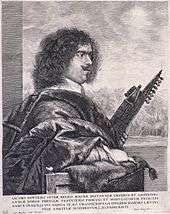Jacques Gaultier

Jacques Gaultier (or Gauterius, Gouterus, Goutier, Gautier, Gautier d'Angleterre, also James Gwaltier[1]) (born ca. 1600, fl. 1617 – 1652) was a French Baroque lutenist and composer. He was not related to the composers and lutenists Denis Gaultier and Ennemond Gaultier.
Not much is known about his early life. In 1617, he had to leave France due to a duel and he escaped to England. He enjoyed the patronage of George Villiers, the favourite of James I of England. In 1622, Gaultier met Dutch poet and composer Constantijn Huygens, with whom he engaged in an exchange of letters. From 1625, he was a musician at the English royal court under Charles I of England. He had to remain there at least until 1640 as he appears as an employee in the court records for that year. In 1627, he was convicted and imprisoned because of English royal family defamation.
In 1630, he travelled to the Netherlands. From there he went to Madrid to play at the Spanish court. In the early 1630s, Gaultier returned to England. Then he was employed again as a court musician, among others, at the performances of the masques The Triumph of Peace (1634) by James Shirley and William Davenant's Britannia triumphans (1637).
References
- ↑ Monique Rollin. "Jacques Gaultier". In L. Root, Deane. Grove Music Online. Oxford Music Online. Oxford University Press. (subscription required)
- Article on German Wikipedia
External links
- Portrait by Jan Lievens
- Portrait by Jan Lievens
- Free scores by Jacques Gaultier at the International Music Score Library Project